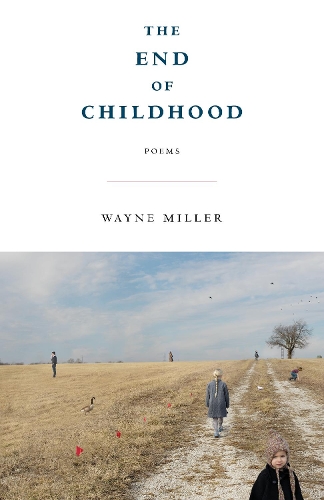
The End of Childhood: Poems
(Paperback)
Publishing Details
The End of Childhood: Poems
By (Author) Wayne Miller
Milkweed Editions
Milkweed Editions
2nd July 2025
United States
Classifications
Physical Properties
Paperback
96
Width 139mm, Height 215mm
Description
A tender and provocative collection of poems interrogating the troubles and wonders of childhood and parentage against the backdrop of global violence.
From the accomplished and tenacious poet Wayne Miller comes a collection examining how an individual's story both hues to and defies larger socio-political narratives and the sweep of history. A cubist making World War I camouflage, a forlorn panel on the ethics of violence in literature, an obsessive litany of "late capitalism" routines, a military drone pilot driving home-here, the awkward, the sweet, and the disturbing often merge. And underlaying it all is Miller's own domestic life and two children, who highlight the hopeful and ingenious aspects of childhood, which endures "not // as I had thought / the thicket of light back at the entrance // but the wind still blowing / invisibly toward me / through it."
Wayne Miller's sixth collection of poems is his most intimate, juxtaposing his fraught youth with his children's cautiously safer one, against insurrection and pandemic, vacation and vocation, art and war. This piercing book spares nothing and no one in searching out a measure of personal truth and benevolence in today's turbulent, brutalizing world, confronted by a singularly candid and lyrical voice.
Reviews
Praise for The End of Childhood
Wayne Millers sixth book of poems is his most moving and most spooky. Permeated by the damages of history, the brutalities of modernity, and the turmoil of consciousness, Millers poems are haunted into a gray lyric radiance. Often situated in wintry aftermaths, the poems have the lapidary quality of last-ditch communications. Still, despite its starting point in whats dire, Millers work longs for the shared breath of meaning, even if the only possible meaning is fragmented and oblique. These poems achieve the beautiful, uncanny fusing that Miller defines as poetry itself: One mouth moving / another.Rick Barot, author of Moving the Bones
Wayne Miller possesses the range and wisdom of the timeless artist. Like Berryman, he personalizes the genre of cultural critique; like Auden, he historicizes the genre of autobiography. From this books opening pages we encounter the ripeness of the poets mind and the extent of his delight and disappointment in the world. I am in awe of this collection of poems, from its deft use of syntax to its dexterous lines and stanzas, from its command of both the short and long form to its expert narratives and fully landed endings: these reasons and more make Miller, to my mind, a true poets poet, a poet to learn from, emulate, and trust.Kathy Fagan, author of Bad Hobby
Praise for We the Jury
These entries candidly showcase the complexity of human contradictions, and the many forms of grief, doubt, and joy on offer. Moving between specific moments in history and ripe lyrical musings, these poems embrace the unanswerable, offering a deep and satisfying look at selfhood.Publishers Weekly
A sharply conceived and exquisitely written collection [. . .] Its especially striking to read these poems now, because they feel perfectly suited for our fractured times, but a collection this assured, this perfectly rendered, will remain fresh and equally resonant for future readers.Los Angeles Review
We the Jury is a book of dark and sometimes surreal love poems from the heart of a man to his wife, his children, his nation, and his past. Marveling at the age of things, Miller writes with an understanding of community and the knowledge that any one understanding must be questioned: we will come down upon us with the weight of our entire existence // even then not one of us // will truly understand what we have done. Its the subtleties and vulnerabilities of these poems that move them from a good look at recent history to a leap of lyric exploration.Jericho Brown, author of The Tradition
Author Bio
Wayne Miller's books of poetry includeOnly the Senses Sleep, The Book of Props, The City, Our City, Post-, andWe the Jury. His awards include a William Carlos Williams Award, two Colorado Book Awards, an NEA Translation Fellowship, six individual awards from the Poetry Society of America, and a Fulbright Distinguished Scholarship to Northern Ireland. He has co-translated two books from Albanian-most recently Moikom Zeqo'sZodiac, shortlisted for the PEN Center USA Award in Translation-and has co-edited three books, most recently Literary Publishing in the Twenty-First Century. He lives in Denver, where he co-directs the Unsung Masters Series, teaches at the University of Colorado Denver, and editsCopper Nickel.
